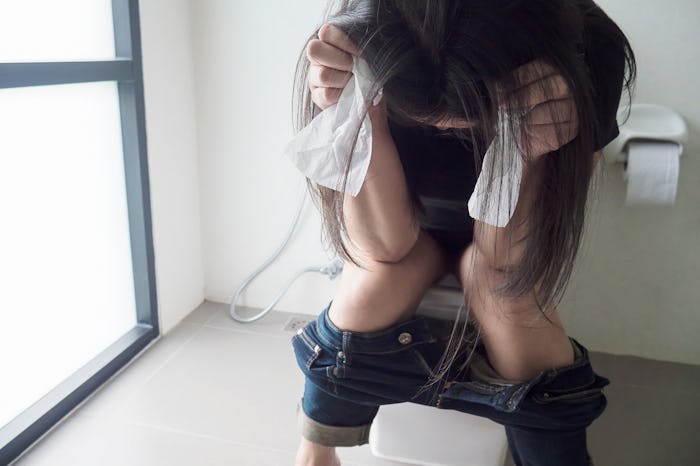Life

You're Not The Only One Feeling Explicably Constipated Once A Month
It seems like there are three types of women when it comes to tracking ovulation: those who can pinpoint exactly when it occurs based on symptoms, those who have a general idea based on their period and/or smart phone apps, and women (like me) who have no dang idea. Whether you're already in-tune with the signs or currently trying to be, you'll see there are a lot of varied symptoms to look for. For many women, constipation is a telltale sign that ovulation has occurred — in fact, it may even be the reason why you're digestive system is seemingly out of whack, and here's why.
There are a few key players throughout your menstrual cycle, with the hormones estrogen and progesterone being two of them. The rising and falling levels of both hormones are what cause many of the changes and symptoms women experience throughout the month, from changes in mood to skin to bloat. When it comes to constipation, progesterone is the specific culprit.
Immediately after ovulating, your progesterone level rises. Your ovaries begin pumping out the hormone in order to support a potential pregnancy. "The most important role of progesterone is to get your uterus ready so that it can receive, implant, and support a fertilized egg during pregnancy," according to the University of Rochester Medical Center. While this is an important and natural occurrence, this increase in progesterone can have a negative impact on your digestive system. "Stool moves through the bowel via peristalsis, the process of the muscles lining the bowel contracting and relaxing to create a rippling, wave-like motion to move things though the intestines," explained Ava Women. "Progesterone can mute this effect. You may even notice that you become slightly constipated after ovulation." In other words... progesterone is great for a fertilized egg, and not so great for your regularly-scheduled bowel movements.
While constipation can be a pain in the butt (ha!), there is relief right around the corner. Progesterone levels will begin decreasing rapidly right before you get your period, which means your constipation will start letting up, too. That is, unless you're pregnant... in which case, get used to the constipation. Progesterone levels remain high during pregnancy, which is one of the reasons why so many women complain about their bowels — or lack thereof — when they're expecting.
Of course, knowing relief will eventually come doesn't make dealing with monthly constipation any more tolerable. Luckily, there are a few different ways to alleviate constipation and all of its fun side effects. Anna Klepchukova MD, the Chief Science Officer at Flo, has a few recommendations for women struggling with an ovulation-induced back-up. Avoiding high fat, high sugar foods, exercising regularly, and drinking plenty of water can all help get your G.I. system moving again. Her best advice, though? "Increasing your fiber intake is your best weapon against constipation," she wrote on Flo's blog. "This can be done through regular meals that include whole wheat bread, high-fiber cereals, and an assortment of fruits and vegetables."
Being a woman is magical. It really is. That said, there are some truly un-magical aspects of it. While constipation isn't a pleasant part of our cycles, it's a completely normal and even expected result of ovulation. Drink your water, eat your fruits, and know that a beautiful, life-changing #2 is one hormone drop away.
This article was originally published on